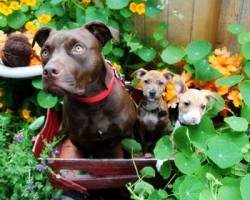
I absolutely love puppies. They are so adorable in every way. I’ve had several throughout my life and the hardest thing about getting a puppy is the training – potty training, obedience training and socializing. All my animals are well-trained and well-socialized. They have to be because I bring so many rescues home and take my dog, Gabby, out in public places all the time.
How does an un-socialized dog act? Many dog owners assume that their adopted or rescued dog was abused because they are shy or aggressive around new people or dogs. These pups tend to cower and shake or act aggressive. When Gabby first came into our home she was absolutely terrified of men. As soon as a man entered the house, she would run into the kitchen and peek around the corner. I immediately thought she was abused by a man before she came to live with us. The reality is often that the dog has not been socialized to people, dogs and new experiences, and can react shyly out of fear and lack of confidence. Some dogs even become aggressive out of fear. I hope Gabby was just un-socialized because it breaks my heart to think of anyone harming her as a puppy, but I will never know. I worked with her for months to become comfortable around men.
According to the American Society for the Prevention of Cruelty to Animals (ASPCA), the socialization period is the most important time in a dog’s life. It starts at about four weeks of age and continues up to 12 to 14 weeks of age. This is the most critical time in a pup’s social development. During this time, a puppy learns how to interact with dogs, animals and people, as well as how to react to new situations and environments. The learning that occurs during the socialization period will have a long-lasting influence on a dog’s behavior as an adult. Pups that are under-socialized can grow up to be nervous and may often become biters due to a sense of fear. Proper and positive socialization will help a puppy become a friendly, outgoing and confident dog.
The best way to help a dog is to build its confidence around new people, dogs and experiences. Making excuses for shy or aggressive dogs or trying to cuddle and comfort them will not fix the problem. It could actually make it worse. Praise and reward your puppy with food treats whenever it behaves appropriately. That worked wonders for Gabby. We would give the new man her favorite treat and have him give it to her. She couldn’t resist and would slowly make her way over. In the beginning, she would gently take the treat and then run away to eat it. Eventually, she realized she was safe and would let him pet her.
When you meet new people while on walks, have them be as neutral as possible. Have them turn to the side, make no direct eye contact with the dog, and let it be the dog’s idea to go to them. Don’t force your pup to interact. If he is nervous about a specific person or situation give him the chance to gain confidence by letting him investigate the situation for himself.
It’s important to expose a dog to as many people and other animals as possible (always in a safe environment and on a leash). Calmly praise and reward the dog for behaving nicely. Let the puppy meet friends, children in the neighborhood, the mailman, etc. I have a treat bag attached to the leash and when strangers stop to say hello I ask them to give the dog a treat. I’ve done this with Gabby and every foster dog I’ve had. It works wonders for socializing.
I encourage anyone to enroll their puppy in a puppy socialization class. This is a great way for the puppy to meet new people and other dogs. It will likely be good for the owner, too. It’s a good way to learn about normal dog behavior and how to teach the pup basic obedience. The lifespan for dogs today is on average 10 to 15 years. It is well worth it to spend the extra time and energy to provide a puppy with positive and rich socialization, so pet owners can enjoy their companion animal for many years to come.
Lori Fusaro has been voted the best portrait photographer by FoxTV three years in a row. She lives in Culver City with her husband, four cats, and dog. Contact: Lori@FusaroPhotography.com, www.FusaroPhotography.com.
